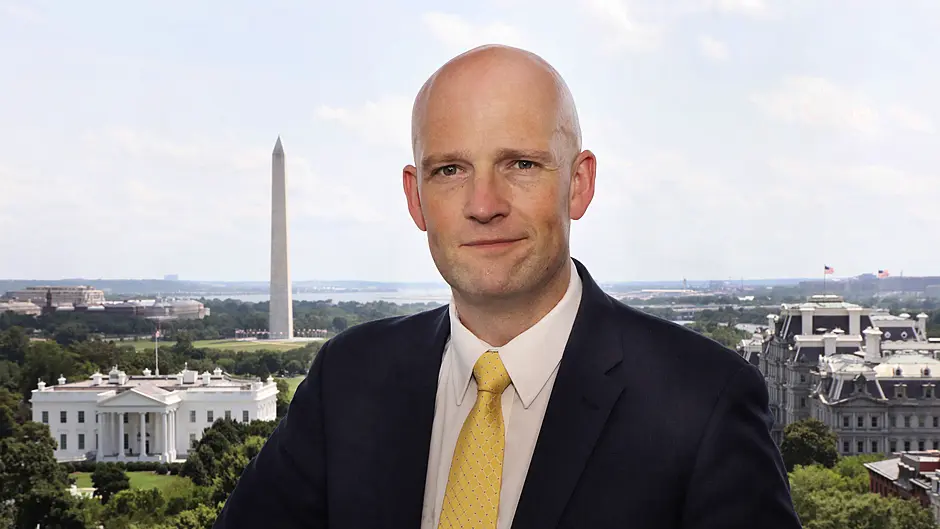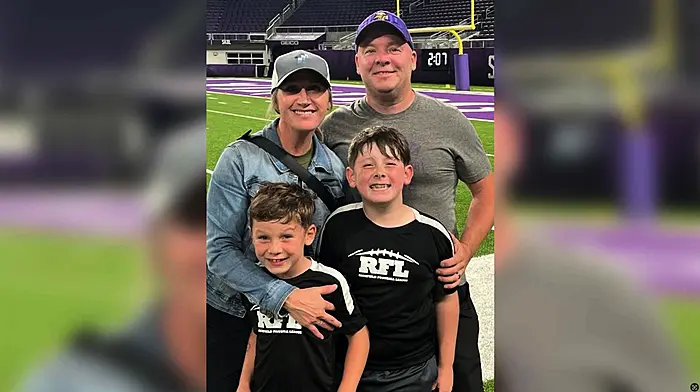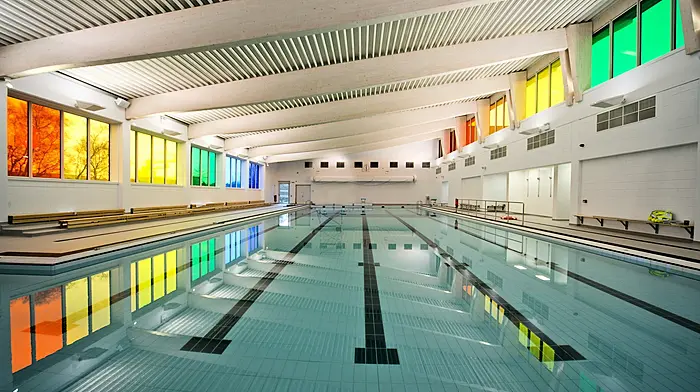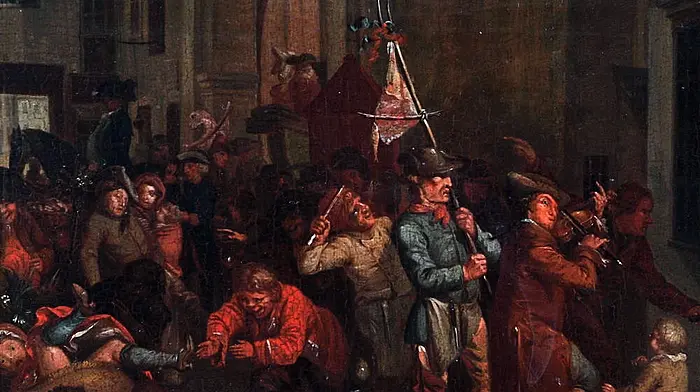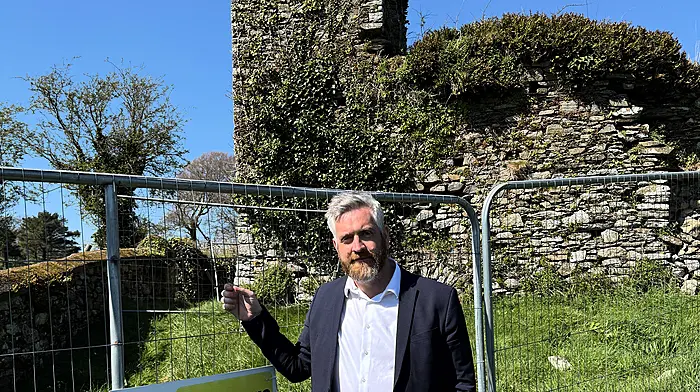RTÉ’s Washington correspondent Brian O’Donovan is moving home after his four-year stint in the US. The Farran man loved every minute, but is looking forward to the next challenge.
TWO West Cork natives, who are high-profile journalists on opposite US coasts, were in the same Leaving Cert class, and jointly delivered the end-of-year address at their graduation mass 22 years ago.
That’s RTÉ’s Washington correspondent Brian O’Donovan and editor-in-chief of Glamour magazine, Samantha Barry, who both attended Ballincollig Community School. Brian recalled the lesser-known story when he was home from the US at the weekend to promote his book Four Years in the Cauldron, and lamented that there isn’t a picture of them doing their thing back in 1999.
Samantha, whose parents live in Bantry, is based in New York but the former school mates have met once or twice since Brian has been based in the US.
‘Samantha’s great; she’s wonderful, I’m in awe of her success and her career,’ said Brian. He’s also met CNN correspondent Donie O’Sullivan from Kerry and is a ‘big fan of his work.’
‘They are two great success stories here in the US,’ said Brian. The Farran man is undoubtedly a third, and has become a favourite of the nation after reporting on everything from Trump’s presidency, the knife-edge election of Joe Biden, the Covid emergency, the Capitol riot and the murder of George Floyd over the past for years. His book includes all these, but also observations on what it’s like to live in a country ‘shaped by guns, God, far-fetched conspiracy theories and the running sore of racism.’
He thrived on the ‘rollercoaster’, but says he was always very aware that he was just a visitor to the country.
‘I was reminded of this constantly over the four years, that while I was a guest in America, and I was witnessing these massive changing events, these controversial Donald Trump rallies, storming of the Capitol building, comments about immigrants, building a wall ... that I was reporting this, but Americans were living it, and I saw this with friends, neighbours, and camera people.
‘Murray, my current camera man, will every now and then turn around and say, “what’s happening to my country?,” but for me it was different, I was a guest of the country, living it, but knowing we were going to leave at some point.’
He’s also very aware that America is a fantastic country for someone who has money and who can afford to live in a nice part of a city, that has the nice school etc.
‘It’s a problem for America, those who don’t have, definitely have a harder time of it. I think there’s an attitude in America, which is wonderful in many ways, and that’s if you work hard, you’ll earn what you need to earn and you’ll do well in life; but if you’re down on your luck, and if things don’t go your way, there are not as many supports as there would be in Europe, like help with social welfare, schooling, education.’
The pandemic exposed a lot of inequalities in the US and the groups he said that were disproportionately affected were African Americans and the undocumented Irish.
‘If you are undocumented you live in the shadows, you can’t avail of the supports. We interviewed a man on the street in New York, a plasterer who lost his job when the pandemic hit, he had nothing. But the Irish community rallied around in cities like New York and Boston, did food drops, helped people out with bills, and it was an impressive show of strength.’
Brian is moving back to Dublin in December, when the four-year post concludes, with his wife Joanna, who is from Crosshaven, and their daughters Lucy (11) and Erin (8).
He will remain a journalist for RTÉ news and will be given another assignment, which he hopes will be Dublin-based.
‘I’m absolutely delighted with my time in the US, I feel like I’ve left nothing behind, I couldn’t have asked for more big news stories,’ he said. ‘The girls loved it, too, but it’s time to move on with things. My wife is a primary school teacher in Lucan and she paused her career for four years. That needs to resume and the kids have been missing out on Irish school for four years, and that has to resume as well.’
The role as Washington correspondent is without doubt a busy one.
‘From a television point of view, your two main deadlines are the six o’clock news and the nine o’clock news, which is 1pm and 4pm my time.
‘The more challenging time zone difference came with doing Morning Ireland because that would usually be pre-recorded around 1am my time. You didn’t do that every night, you physically couldn’t. But during busy times you did, and you wanted to do it then, it’s a rush, you want to be all over the story.’
Brian credits his dad Jim, who is originally from Ardfield, with his career choice. He was involved in theatre in Farran hall where, Brian says, he got a love of performance and ‘the buzz of the live’.
While he was studying communications in DCU, Cork-based radio station RedFM launched and were looking for weekend DJs and newsreaders. ‘I applied for both. I never got a call back for the DJ, I did get a call back for the newsreader job, and that’s how I got into it!’
He doesn’t pretend to be known to Donald Trump, and said all he could do was ‘to be as loud as possible at news events’ to try and get a few words with him.
He recalled when Trump was due to visit Ireland in 2019, but ‘it was all very vague, nothing confirmed.’
‘We went down for several days to try to get his attention when he did his chopper talk, but I failed on two occasions. Then Joanna suggested I shout out Doonbeg, and it worked! He heard me and came over, and he gave me a short interview.’
He said Trump did away with formal press conferences and did media in a very un presidential way.
‘But in a bizarre way it benefited me because as a smaller TV station from abroad I don’t get the access that the US networks do, so when there were these opportunities where we could all line up, it was helpful.’ His overwhelming memory from the four years is one he neither calls a high nor a low. ‘It’s what I call my biggest Reeling in the Years moment. It was October of last year when Donald Trump was diagnosed with Covid himself and myself and cameraman Murray were outside the White House doing a live report into the nine o’clock news and a very aggressive police office came over and started screaming at us to clear the way and get out of there. We didn’t know what was going on, we knew Donald Trump had been diagnosed with Covid. But it was that his condition had deteriorated, he was very, very sick. They had to bring in a helicopter to take him to hospital and that’s why they were clearing the area.
‘That evening always stays with me, we stood there, watched the helicopter come in and him being taken to hospital and it was this bizarre moment. But it was a rare moment of unity in Washington that night, whether you liked him or hated him, it was still a human being, the president of the United States, very, very sick with a potentially lethal virus. ‘A surreal moment in what was a year of bombshells and surprises and shocks.’
He said division is still very stark in the US after four years of Trump. ‘Huge numbers of the electorate still believe firmly that the election was stolen – which it wasn’t, that’s a lie. But Donald Trump keeps saying this, and people have latched onto it.
‘Then Joe Biden, in his inauguration, spoke about how he was going to unify everyone but he hasn’t, because when he tries to pass a piece of legislation he meets with terrible opposition in the Republican party. So it’s a divided country right now, there’s a tension there, but I think it will ease and heal over time. America is a country that can repair itself.’
And it’s already looking like Trump will be back for the 2024 elections.
‘There are a couple of things that might go against him – investigations into his finances, into his business dealings, maybe something might come up that might scupper his chances. You also have other people in the Republican party who are quite ‘Trumpian’, and quite in his ilk, maybe one of those might rise up and be more popular in the polls, but right now it’s still three years away and a lot might happen.’
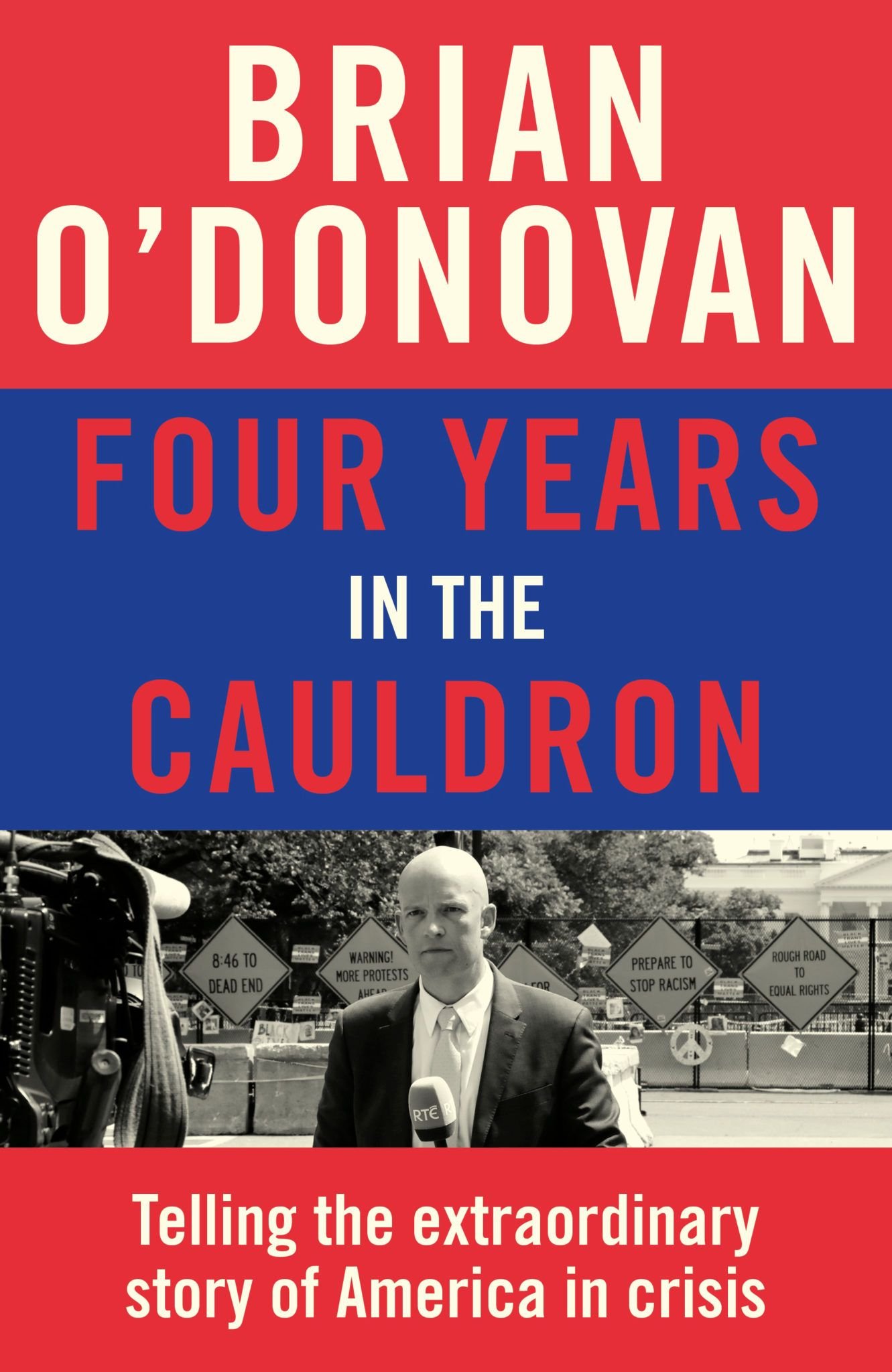 Brian says he thrived on the ‘rollercoaster’ of US politics.
Brian says he thrived on the ‘rollercoaster’ of US politics.
‘Four Years in the Cauldron. Telling the extraordinary story of America in crisis’, is published by Penguin Sandycove (€20).

